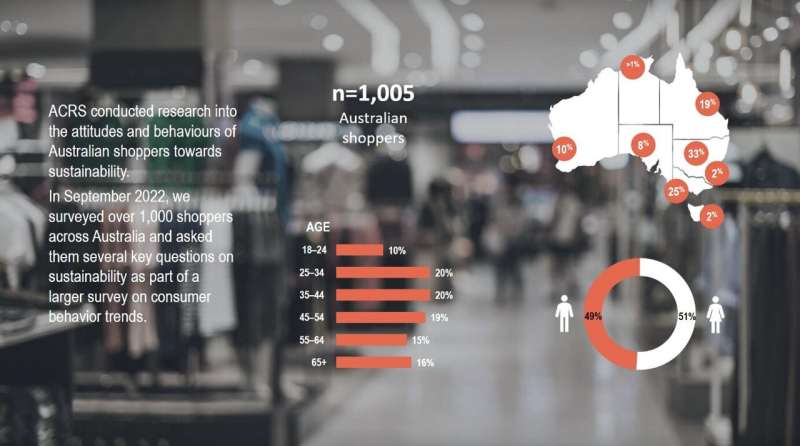Aussie shoppers are no longer buying the throwaway culture

Australian consumers are rejecting the throwaway culture, instead snapping up sustainable options, according to new research from Monash University.
A report released by Monash Business School's Australian Consumer and Retail Studies (ACRS) research unit has found that Australian consumers want sustainable products and are increasingly looking for more environmentally conscious shopping options.
More than half (52%) of the 1,000 Aussie shoppers surveyed for the latest retail monitor report "Spotlight on Sustainability," say they are giving more thought to the social and environmental impact of their purchases before they buy, and are even willing to pay more for products that are ethically produced.
Among the report's key findings:
- 85% of survey participants said that durability and repairability (73%) were priorities when making non-grocery purchases
- 38% have reduced the number of new products purchased
- 45% are willing to pay more for ethically produced products
- 42% would pay more for products packaged in recycled material
"Today's customers are sustainability-savvy and they are increasingly contemplating the social and environmental footprint of their purchases before they buy," says the report's lead author Dr. Eloise Zoppos, principal research consultant and research fellow in the ACRS research unit, in Monash Business School's Department of Marketing.
"Pleasingly, both industry and government are taking note, actively seeking sustainable solutions to meet consumer demand and making sustainability a priority," she adds.
Over the last three months, participants in the Spotlight on Sustainability survey purchased clothes, footwear and accessories (70%), personal care (49%), household goods (42%), books and stationery (38%), consumer electronics (26%), toys and games (24%) travel and tourism (21%), media and entertainment (18%), automotive (16%) and sporting goods and equipment (16%).
The report's findings show that consumers are notably keen to support locally sourced and produced goods (44%) and increasingly aware of the benefits of offsetting costly carbon emissions from shipping and transportation, they are also prepared to pay more for locally produced items.
And, they are walking the talk, with 96% engaging in sustainable practices such as bringing their own shopping bags and recycling product waste regularly, over the three months of the survey.
"It is clear from our research that sustainable shopping practices are important to us, and from a lifestyle perspective, most Aussie shoppers are engaging with sustainable lifestyle practices and are committing to them," says Dr. Eloise Zoppos.
Aussie shoppers are increasingly more conscious of the environmental impact of their purchases and everyday activities and believe they can make a difference—and many retailers are getting on board, the report says.
Premium outdoor clothing and gear label Patagonia is leading by example, successfully making the promise of durable and repairable products a core promise of their brand. Their "Ironclad Guarantee" offer, allowing customers to repair, replace or refund products that do not meet expectations has proven very popular.
Patagonia also provides DIY repair guides, repair services and even a dedicated Worn Wear Repair Hub at the Patagonia Sydney store. More recently, Patagonia donated all non-voting stock to the Holdfast Collective, a non-profit dedicated to the climate crisis. All profits, after re-investing into the business, are used as a dividend to support the non-profit organization.
Other businesses are focusing on sourcing local manufacturing and suppliers, over overseas alternatives, in a bid to reduce their carbon footprint.
Gold Coast-based skin care brand Alpha-H, actively engages local suppliers to provide ingredients for their award-winning formulations, and suppliers who are RSPO (Roundtable on Sustainable Palm Oil) certified. In addition, all their liquid waste is diverted to local land revegetation projects.
Other retailers are embedding sustainability into company policy and growth agendas, while the Australian consumer watchdog listed consumer and fair trading issues in relation to environmental claims and sustainability as one of their compliance and enforcement priorities for 2022–2023 (and just this month began their online review of at least 200 brands for misleading sustainability claims).
Yet it's the everyday, Aussie shopper driving this change, with consumers taking more responsibility to drive sustainable change through their everyday purchases and lifestyles and wanting businesses to enable change.
A report published by EY Australia found that half (54%) of Aussie consumers believe it's their responsibility to drive businesses to better social and environmental outcomes.
Only a third (34%) of Australians believed what they do does not make a big enough impact on the environment.
"This consumer-led sustainable product revolution is underway," says Dr. Zoppos, "and it's a movement that is gaining momentum. Thankfully, business and government are responding to the call."
Provided by Monash University





















